
Illinois Department of Financial and Professional Regulaon
Quarterly Newsleer
THE DIVISION OF REAL ESTATE REVIEW
SUMMER 2023
ALSO INSIDE:
NEW COMMUNITY
ASSOCIATION
MANAGEMENT
RULES TAKE EFFECT
THE COMPLAINT PROCESS
Page 7
VIRTUAL OFFICES
Page 10
Page 4

2
CONTENTS
LETTER FROM THE DIRECTOR 3
NEW COMMUNITY ASSOCIATION MANAGEMENT RULES
TAKE EFFECT 4
THE COMPLAINT PROCESS 7
REAL ESTATE BROKERS: IS IT POSSIBLE TO ENGAGE IN
UNLICENSED PRACTICE EVEN IF YOU HAVE A LICENSE? 8
ARE ALL HOME INSPECTION BUSINESSES REQUIRED TO
BE LICENSED? 9
VIRTUAL OFFICES 10
EVENTS 11
EMPLOYEE SPOTLIGHT 14
SCHOLARSHIP PROGRAM 15
CHRIS POSEY: NEW BOARD MEMBER FOR THE REAL
ESTATE APPRAISAL ADMINISTRATION AND
DISCIPLINARY BOARD 16
QUARTERLY ENFORCEMENT REPORT 17

Greetings from the Division of Real Estate!
This spring was busy in the Division of Real Estate. Our sta set aside time
to sit down in both the Springeld and Chicago oces to engage in a “team
reset.” We focused on each other as individuals and as a team, discovered
our leadership strengths, and built on improving our communication, systems,
and processes. We set and reset goals and identied the paths to achieving
them. Our mission is to leave this Division in a better place than how we
found it, and I’m condent we are headed in the right direction!
I hope to make this reective practice a more regular occurrence. As we nd ourselves in the midst of
summer, the interaction, optimism, energy, and condence that has been reignited will serve us well as we
head toward a new year. Coming out of the remote working times, reconnecting with each other and the
public whom we serve, is both refreshing and inspiring to us.
In this edition, you will see some of the important work that has already been accomplished and how much
the Division of Real Estate is committed to improving both internally and externally.
Enjoy the read!
Sincerely,
Laurie Murphy
Director, Division of Real Estate
3
LETTER FROM THE DIRECTOR

New administrative Rules governing Community Association Managers and Community Association
Management Firms (68 Ill. Adm. Code 1445) became eective June 2, 2023. The new Rules represent a
major overhaul to the prior Rules, which were adopted in October 2011.
The Rule:
(1) Requires community association management rms engaging in the business in Illinois,
regardless of when they were formed, to be licensed;
(2) Establishes the requirements and curriculum for continuing education;
(3) Sets forth the process for the Division’s approval of continuing education providers, also known as
education sponsors, and their courses;
(4) Denes the term “supervision” and how it applies to designated community association
managers of rms;
(5) Articulates requirements for the insurance coverage required of designated community association
managers or community association management rms; and
(6) Provides additional grounds for discipline to ensure the protection of the public and to maintain the
integrity of the profession.
What are the requirements for a Community Association Management Firm to operate in Illinois?
Community association management rms must be authorized to conduct business in the State of Illinois
through the Secretary of State, apply to the Department on forms provided, and pay a non-refundable fee
in the amount of $650.00 to become licensed.
A person applying for a community association management rm license must also provide evidence
that the community association management rm has a licensed and designated community association
manager. (Section 1445.35)
Community Association Management Firm licenses have a two-year term. Every Community Association
Management Firm license will expire on August 31 of odd-numbered years. Licenses rst issued in 2023
will expire August 31, 2025. The renewal fee for a Community Association Management Firm license is
$650.00 for a two-year term. (Section 1445.70)
For more information on Community Association Firms, visit our Frequently Asked Questions (“FAQs”) here.
NEW COMMUNITY ASSOCIATION
MANAGEMENT RULES TAKE EFFECT
4
Adrienne Levatino
Associate General Counsel
5
What are the requirements of a Designated Community Association Manager for a rm?
A designated community association manager (“DCAM”) must be a licensed community association
manager. No community association manager may be the DCAM for more than one community association
management rm, and the rm must only have one DCAM.
A DCAM must:
(1) Have an ownership interest in or is employed by a community association management rm
to act as a controlling person; and
(2) Be the authorized signatory for the rm on community association accounts; and
(3) Supervise, manage, and be responsible for the rm’s community association manager
activities.
The DCAM is responsible for managing and supervising all licensed and unlicensed employees acting on
behalf of a community association management rm.
“Supervision” includes:
(1) Implementing and communicating oce policies and procedures;
(2) Training of licensees and unlicensed employees;
(3) Supervising those association accounts over which the Community Association Management
Firm has delegated responsibility to the DCAM;
(4) Supervising all advertising or any community association management service;
(5) Training licensees on the requirements of federal, State, and local laws relating to the
practice of community association management; and
(6) Overseeing compliance with the Rules by licensees and oces under their supervision.
(Section 1445.110)
What are the continuing education requirements?
Beginning with the renewal period ending August 31, 2025, each Community Association Manager must
complete 12 credit hours of continuing education (“CE”) for each renewal period.
CE credit may be earned for veried attendance at or participation in a course oered by an approved CE
sponsor that is as follows:
(1) Community Association Managers International Certication Board (“CAMICB”);
(2) Community Associations Institute (“CAI”);
(3) Apartment Building Owners and Managers Association (“ABOMA”);
(4) Institute of Real Estate Managers (“IREM”);
(5) Association of Condominium, Townhouse and Homeowners Associations (“ACTHA”);
(6) Any Illinois-accredited school, college, or university; and
(7) Any Illinois-approved education sponsor oering courses relating to the curriculum set forth in the
Rule.
Courses may be oered through distance education, an interactive delivery method, or a webinar. (Section
1445.200)
What about insurance?
The Rules provide that, in order for a DCAM or the Community Association Management Firm that employs
them to have access to or disburse community association funds, there must be delity insurance in place
to insure against loss of theft of community association funds.
6
The delity insurance must be in the maximum amount of coverage available to protect funds in the control
of the DCAM or the Community Association Management Firm providing services to the association.
It must cover the DCAM, the rm, all community association managers, partners, ocers, employees,
ocers, directors, and employees of the Community Association Management Firm.
The DCAM or their Firm must also obtain general liability and errors and omissions insurance to cover any
losses or claims against a Community Association Manager, the DCAM, or the Firm. (Section 1445.105)
Are there any new grounds for discipline?
The Rules add grounds for discipline intended to enhance the protection of the public and the professionalism
of Community Association Managers and Firms.
Among them are:
(1) Failing to disclose any aliation agreements, including their terms, which are binding on a client
association;
(2) Failing to return to a community association all original records that are the property of the
community association within 30 days following termination of a management agreement or
other contract;
(3) Charging fees not disclosed to a community association at the time of execution,
amendment to, or renewal of, a management agreement or other contract; and
(4) converting, diverting, or expending funds from a community association account without
written authorization other than to pay expenses incurred by or on behalf of the community
association. (Section 1445.300)
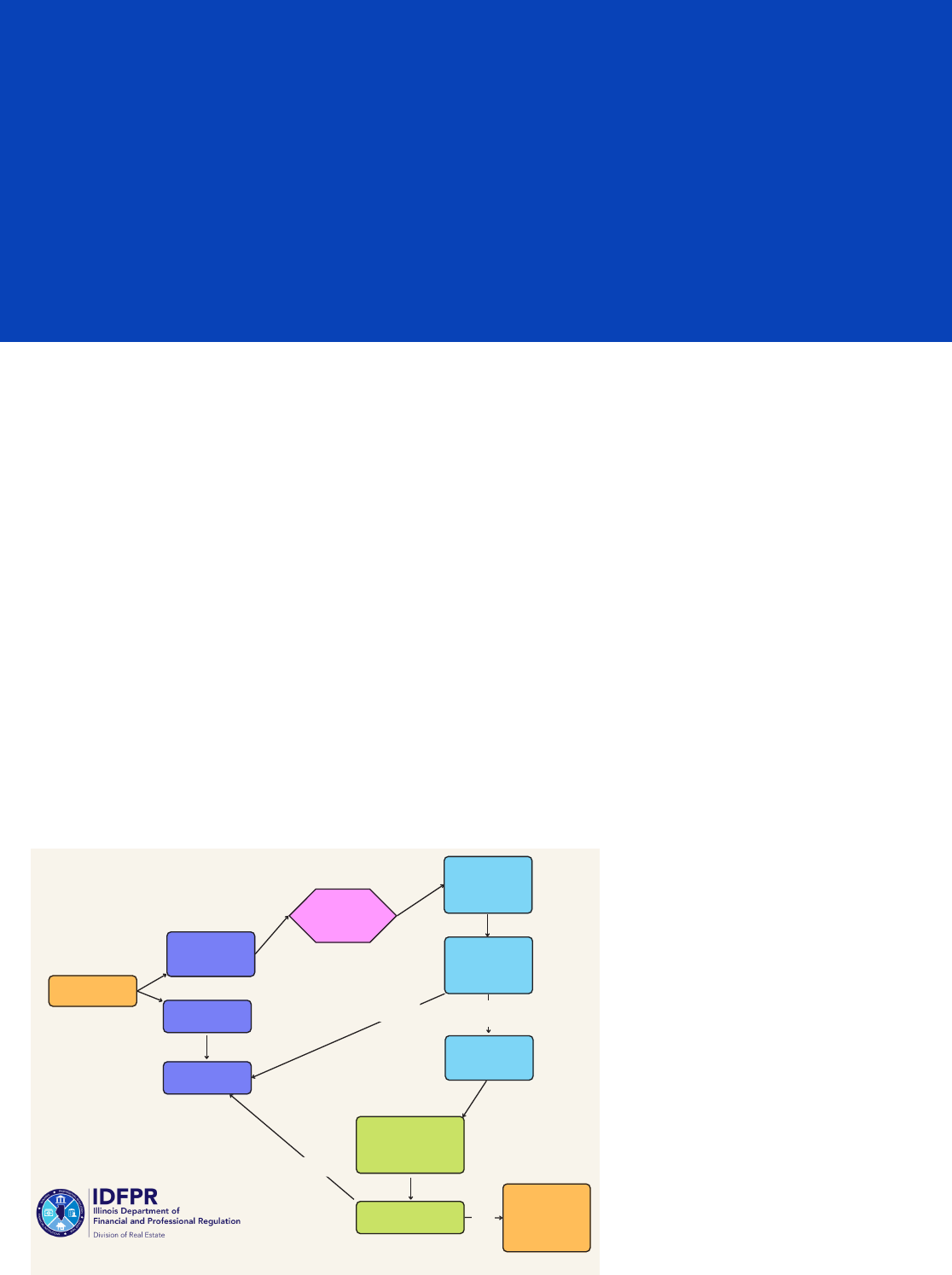
7
THE COMPLAINT PROCESS
Karen Konstant helps run the Complaint Intake Unit for the Division of Real Estate. We receive and review
complaints for the professions of: appraisal, appraisal management companies, auction, community
association management, home inspection, and real estate brokerage. Karen breaks down the complaint
process so that you or a client can better understand the process should a potential violation arise.
• Complaints are received from individuals via mail, email, and referred from other entities or state
agencies.
• Complaints are reviewed and analyzed.
• Complaints that fail to set forth a violation, are outside of our jurisdiction, have gone past the statute of
limitations, or involve individuals/entities that we do not regulate are closed at complaint intake.
• Complaints that pass an initial review are referred to our Real Estate Investigations Unit.
• Complaints are processed and sent to the Investigations unit in a timely and expeditious manner.
Complainants will receive an acknowledgement letter citing a complaint number for future reference
along with the infographic below outlining the complaint process.
• Common complaint allegations
received by the Division of Real Estate
are: failure to return escrow monies,
unprofessional conduct, failure to
account for money of others, breach
of agency duty, unlicensed practice,
misrepresentation and advertising
issues, and failures surrounding
disclosures.
Potential
Violation
Identified
Complaint
Received
No Violation
Identified
Investigator
Assigned
Prosecutor
Evaluates Evidence
Against the Acts
and Rules
Evidence
Identified to
Support the
Complaint
Interviews
Conducted,
Evidence
Collected
Legal Basis to
Continue Forward
Prosecution of
a Complaint
Referred to
Prosecutions
Unit
Path of a Complaint
YES
NO
Complaint
Closed
NO
YES
IDFPR cannot provide a specific timeline for the processing of a complaint. Every complaint varies and may take a different amount
of time to process depending on factors affecting the case.

8
REAL ESTATE BROKERS: IS
IT POSSIBLE TO ENGAGE IN
UNLICENSED PRACTICE EVEN IF
YOU HAVE A LICENSE?
Is it possible to engage in unlicensed practice even if you have a license? The answer is yes. The most
common way for this to happen is during renewal time. If a licensee fails to renew by the expiration of their
license, and continues to engage in real estate activities, they would be considered conducting unlicensed
practice by the Department.
Since license renewals take place during the busy Spring market, we commonly see licensees who
unintentionally allow their license to lapse during the renewal period but continue to conduct real estate
transactions and oer real estate services. Practicing or oering to practice on an expired or inactive
license constitutes unlicensed practice and grounds for discipline pursuant to Section 20-20 of the Real
Estate License Act of 2000. Violating this provision could lead to discipline, including nes, fees, reprimand,
suspension, or even revocation of your license based on the severity of the violation, all of which can be
easily avoided by renewing your license on time.
The second most common way for a licensee to engage in unlicensed practice is by not being sponsored.
Residential Leasing Agents and Brokers must be sponsored in order to engage in licensed activities. This
also applies to Managing Brokers who are not self-sponsored. Making sure you are always sponsored
while engaging in real estate licensed activities is key to avoiding unlicensed practice. This is especially
important when transferring from one sponsoring broker to another.
Designated Managing Brokers should also ensure that sponsoring brokers are not engaging in real estate
activities if the sponsoring brokerage license is expired or not renewed. A sponsoring brokerage license
which becomes inactive or expired automatically renders the licenses of their sponsored licensees inactive.
Allowing your brokers to continue to practice real estate in such a situation would be considered aiding and
abetting the unlicensed practice of real estate.
The unlicensed practice of real estate is not only prohibited for individuals and entities who have allowed
their license to lapse, but also for individuals and entities that have never been licensed in the State of
Illinois under the Real Estate Act of 2000. A copy of the Act and the Rules can be found on our website at
www.idfpr.illinois.gov. Real Estate licenses have a two-year term and expire on:
• Residential Leasing Agents July 31 of even years
• Brokers April 30 of even years
• Managing Brokers April 30 of odd years
• Sponsoring Broker Entities October 31 of even years
Monica Gutierrez
Chief of Examinations and Boards and Complaints
for Real Estate and CAM
8

9
ARE ALL HOME INSPECTION
BUSINESSES REQUIRED TO BE
LICENSED?
Home inspections are an important part of the real estate industry. These inspections can be vital to buyers
in making informed real estate purchasing decisions. One area that sometimes becomes cloudy with our
licensees is whether their home inspection business also needs a license.
The Home Inspector License Act (225 ILCS 441) specically addresses this issue. Under Section 5-5(a) in
which it states in part:
“It is unlawful for any person, including any entity, to act or assume to act as a home inspector, to engage
in the business of home inspection, to develop a home inspection report, to practice as a home inspector,
or to advertise or hold oneself out to be a home inspector without a home inspector license issued under
this Act.”
However, there is an exception for all home inspector entities where the only home inspector for the entity
is the sole owner of the company. In such cases the entity does to need a license, however the entity is
not prohibited from obtaining one if they so choose.
This exemption regarding this is stated in section 5-5(d) of the Act:
“The licensing of home inspector entities required under this Act does not apply to an entity whose
ownership structure is one licensed home inspector operating a sole proprietorship, a single member
limited liability company, or a single shareholder corporation, and that home inspector is the only licensed
home inspector performing inspections on the entity’s behalf. The licensed home inspector who is the
sole proprietor, sole shareholder, or single member of the company or entity shall comply with all other
provisions of this Act.”
Another issue that often goes hand in hand with this one involves the business’s name. “If a licensee
operates under any name other than that appearing on his or her license, he or she shall submit to the
Division a certied copy of his or her registration under the Assumed Business Name Act [805 ILCS 405]
at the time of application or within 30 days after the registration.”
In short, planning ahead for business needs as a sole proprietor can sometimes mean having the business
entity licensed with the Department which allows for the hiring of other inspectors should the need arise.
As a reminder, if the home inspector is the sole owner and inspector, the entity license exemption applies.
Also remember that if a sole proprietor is operating a business under a name other than the name on their
license, the business name must be registered with the Department.
Elliot Dubin
Staff Prosecutor

10
VIRTUAL OFFICES
After becoming the rst state to recognize and register virtual oces for real estate brokerages, the Division of Real Estate has
issued more than 30 Virtual Oce licenses to actively licensed sponsoring brokers.
So, what is a virtual oce?
The Administrative Rules Section 1450.610 denes it as: “an oce from which real estate brokerage services are provided,
without a dedicated oce space or xed physical location, under the supervision of the designated managing broker, and that
is owned, controlled, operated or maintained by a licensee…”
Okay, but what does that mean?
In simple terms it is a designation that allows the holder to operate in Illinois without a physical, bricks and mortar location. As
the real estate profession is constantly evolving, the Division of Real Estate saw an opportunity to set a statutory path to allow
for the real estate profession to conduct business in a virtual platform. The virtual oce option is aimed at real estate operations
of all sizes. Whether it be a one-person shop, or a rm with numerous sponsored licensees, the virtual oce is available.
I’m sold, what do I need to do?
First step is to hold a sponsoring broker license. That includes all types of entity formations, from self-sponsored managing
brokers to licensed entities. After that is accomplished, the registration is where you will document and provide the details of
the proposed online system or platform. That application is then submitted by email to fpr[email protected].
How do I set up the system or platform?
An excellent question, but one we cannot answer for you. The biggest hint, after reviewing dozens of applications, is to be sure
your online or digital platform includes ALL tools needed to conduct real estate transactions. The virtual oce setup should
mirror a physical oce with the only dierence being there is no “bricks and mortar” location.
There should be a digital platform, most commonly in the form of a website, where consumers may search listings, review
sponsored licensees, ask questions, and oer real estate services. From there, a secure back-oce should be accessible for
the sponsoring broker’s sta. This area also holds escrow documents (if applicable), contract documents, and anything else
needed to successfully coordinate and process real estate transactions.
All of this should be accessible from the digital platform so that any involved party has the tools needed to complete the
transaction without having to conduct business from a physical oce. There are many options out on the market, and while we
cannot specically recommend any of them individually, an online search is a good place to start.
Got it, how long does it take to obtain the license?
That depends on you! Most are issued within 2-4 weeks depending on any deciencies found. Currently, I, Chief of Licensing
and Education, Jeremy Reed have been personally reviewing the incoming applications. The best results have been from
applicants who are willing to work collaboratively with our unit and address deciencies found upon review. It is recommended
that any interested party review Section 1450.610 and strive to meet the requirements listed in 1450.610(d).
Is the Virtual Oce the right tool for you or your rm?
It could be, but please understand the requirements to obtain the license are more than just creating a website. The platform
must meet all the requirements to operate an oce under the Act which includes all the tools needed, for consumers, sponsored
licensees, and sta. Still have questions? Contact us at fpr[email protected] or visit our YouTube page or Virtual Oces
F.A.Q. where we have posted videos explaining the process!
Jeremy Reed
Chief of Licensing and Education
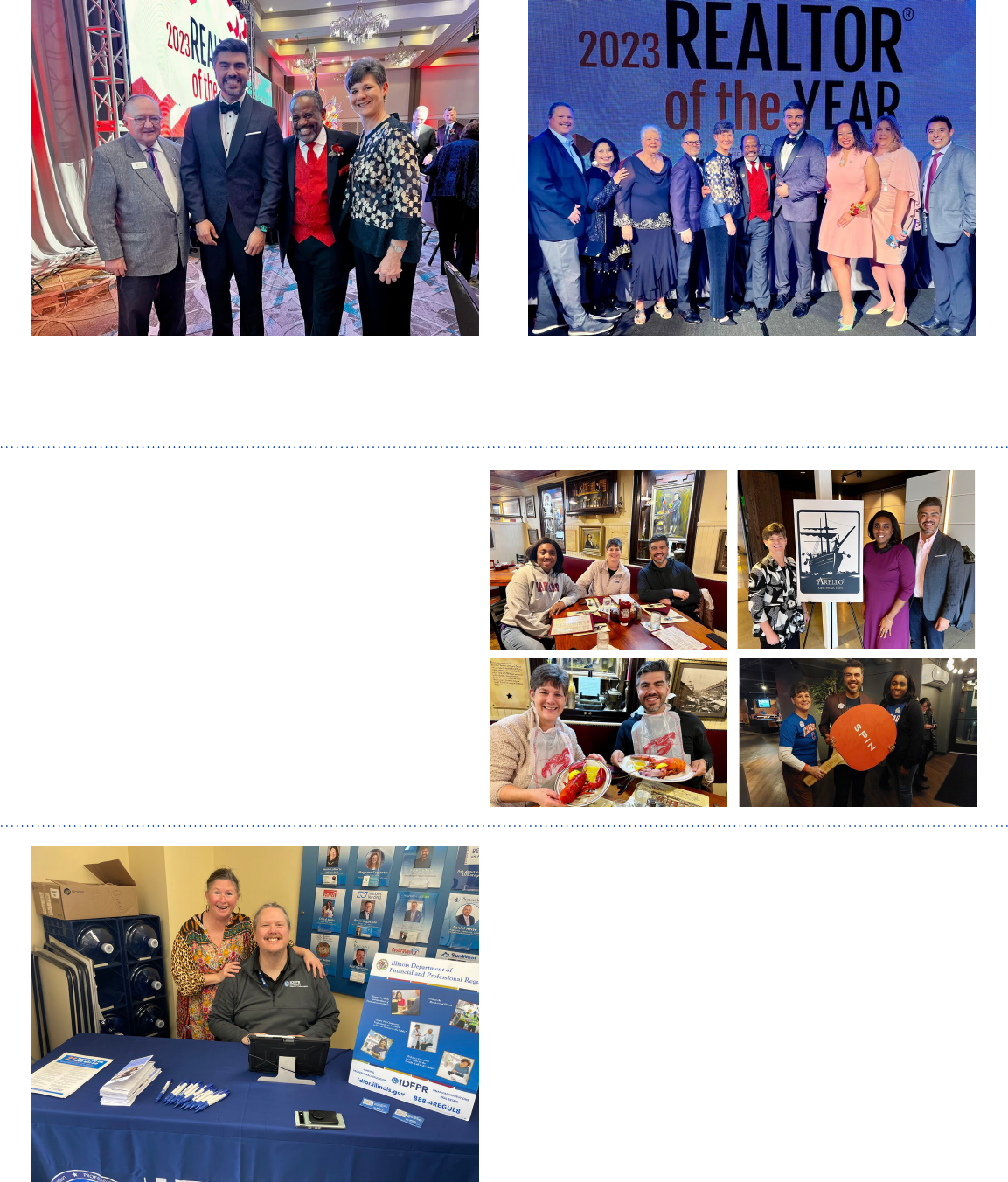
11
EVENTS
The Illinois Realtor of the Year Award Gala took place in Springeld on April 24. Secretary, Mario Treto Jr.,
Director Laurie Murphy, Chief of Licensing and Education Jeremy Reed, and several Division of Real Estate
board members were in attendance to celebrate this year’s recipient, Zeke Morris.
This year’s mid-year conference of the Association
of Real Estate License Law Ocials (“ARELLO”)
was held April 26-28 in Boston, MA. Secretary
Mario Treto, Jr., Director Laurie Murphy, and
Deputy Director Ericka Johnson attended the
conference which focuses on providing resource
materials, trainings, certication programs, and
facilitating collaboration around best practices in
real estate regulation.
Chief of Licensing and Education Jeremy Reed
and Operations Manager Jennifer Rossiter Moreno
attended the Heartland Realtors Organization
Expo sharing regulatory information and answering
questions for licensees. The event was held on May 5
in Crystal Lake.
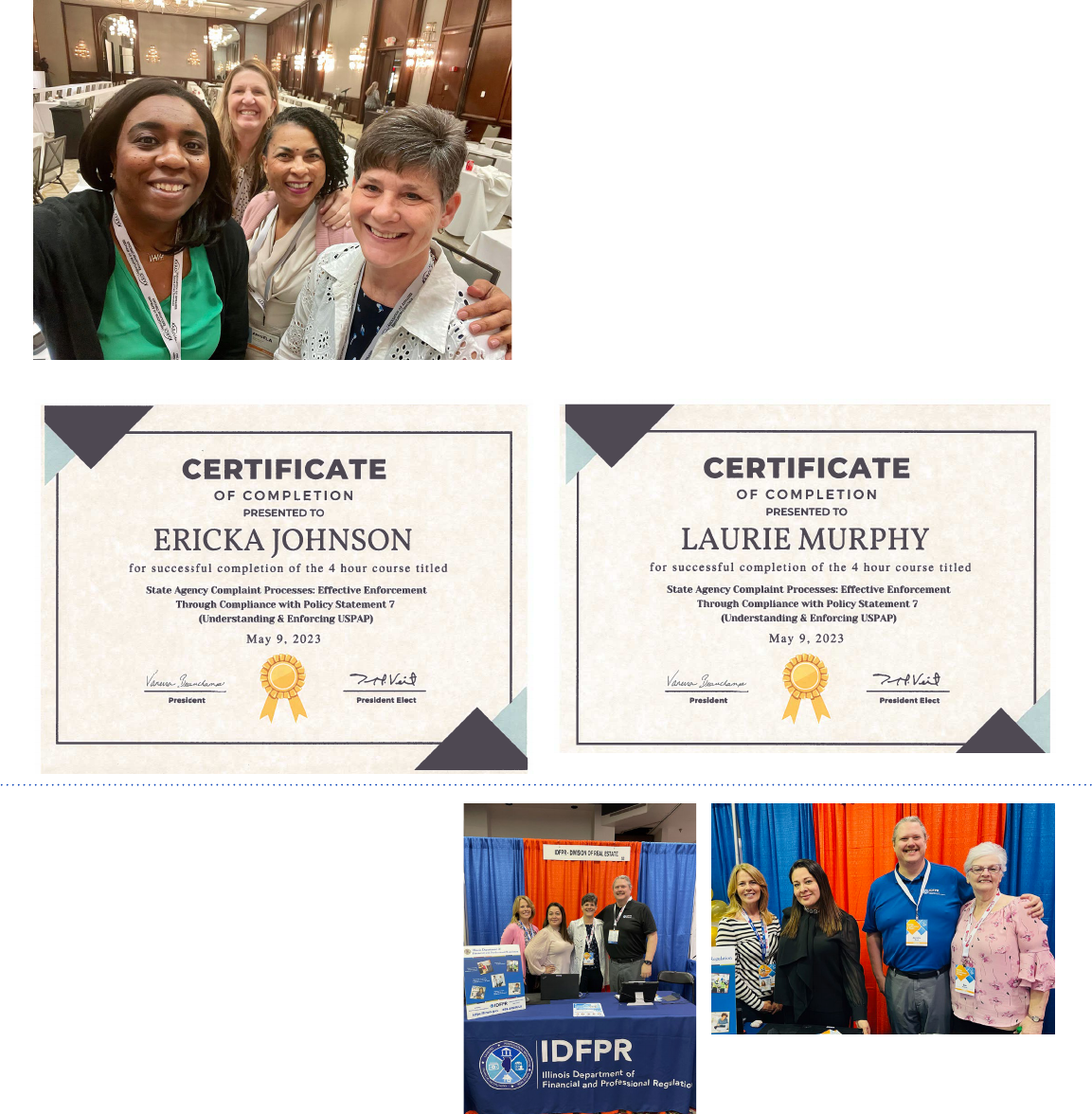
1212
EVENTS (continued from page 11)
The Association of Appraiser Regulatory Ocials (“AARO”) Spring Conference took place May 9-11. AARO
is the only national non-prot association solely dedicated to advocating for the 55 member states and
jurisdictions who are mandated by Congress to have appraisal regulatory agencies. In addition to actively
participating in all aspects of the conference, both Director Laurie Murphy and Deputy Director Ericka
Johnson completed an extra training earning achievement certicates.
A team from the Division of Real Estate
represented IDFPR at this year’s Illinois
REALTORS® Spring Conference in
Collinsville on May 23 and 24! Director
Laurie Murphy, Chief of Licensing and
Education Jeremy Reed, Chief of Boards
and Complaints Monica Gutierrez,
Examiner Billie Phillips, and Sue Pickett
from the Licensing Section attended the
two-day conference where they were able
to answer licensee questions and assist
with any licensing issues in real time. Thank
you for having us, Illinois REALTORS®!
From Left to Right: Deputy Director Ericka Johnson, AZ
Investigator Kelly Luteijn, CA Executive Director Angela
Jemmott, and Director Laurie Murphy.
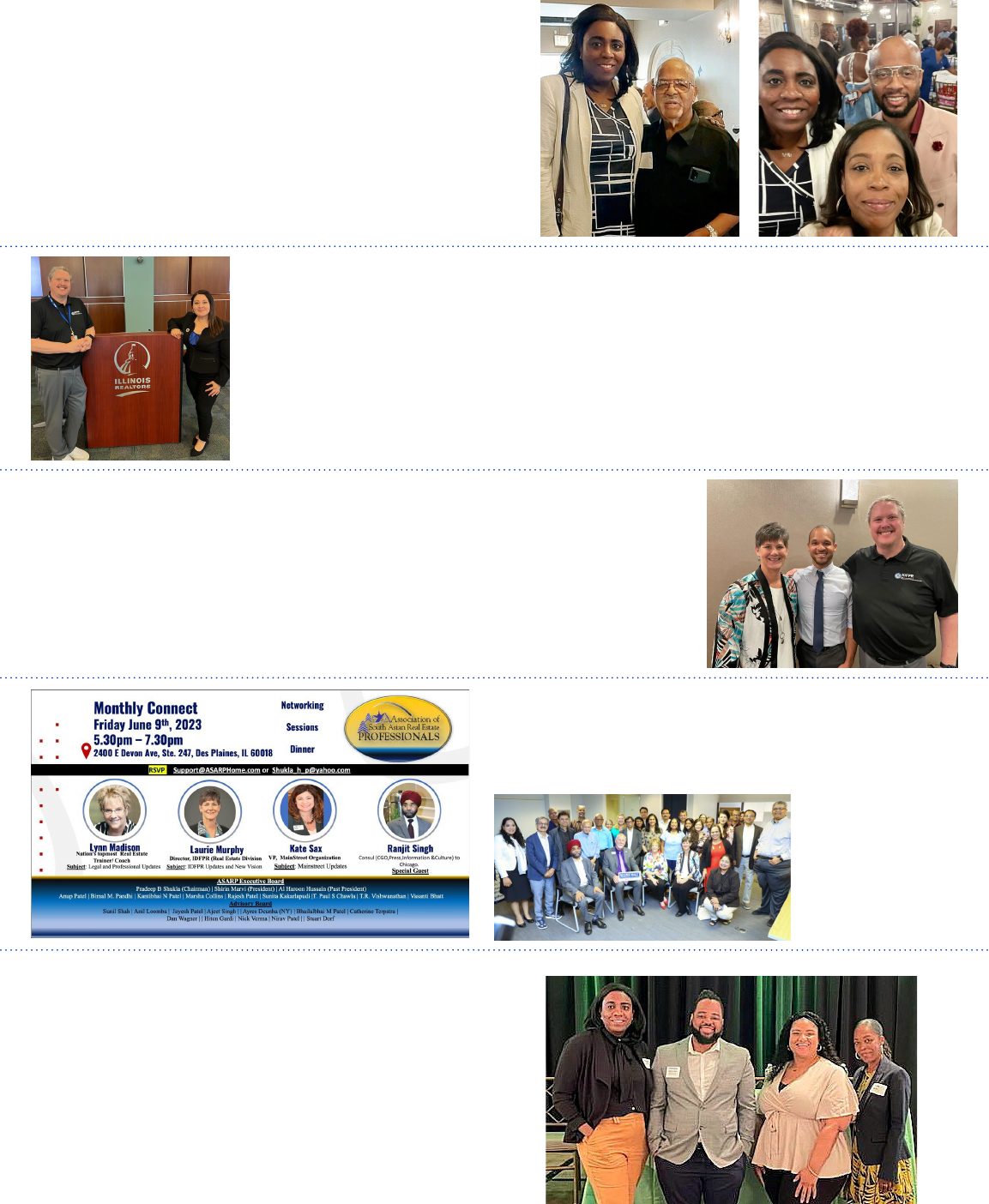
13
EVENTS (continued from page 12)
On the evening of May 24, in Beverly Chicago, Illinois, Deputy
Director Ericka Johnson attended a celebration honoring
Mr. Frank J. Williams for being awarded the 2023 National
Association of Realtors® Fair Housing Champion award.
Several Division of Real Estate board members were also
in attendance including appraisal board members Cecelia
Marlow and Chris Posey.
The Illinois Realtors® Association Instructor Advancement Training on June 1 featured
Chief of Licensing and Education Jeremy Reed and Chief of Boards and Complaints
Monica Gutierrez who presented on insights and updates about the Division of Real
Estate, with a focus on licensing and education.
The Association of Illinois Real Estate Educators (“AIREE”) welcomed Director
Laurie Murphy and Chief of Education Jeremy Reed on June 9 to their Instructor
Training Conference. Nate Chandler from the Licensing and Education unit was
also in attendance. The Director and Chief shared information and exchanged
ideas with association members, which includes licensed education providers and
licensed real estate instructors.
Also on June 9, Director Laurie Murphy was invited to
attend a meeting of the Association of South Asian Real
Estate Professionals (“ASARP”). She presented legal and
professional updates from the Division of Real Estate.
On June 27, Deputy Director Ericka Johnson and Appraisal
Board member Cecelia Marlow attended the Huntington
Bank Diversity, Equity, and Inclusion: Building Wealth and
Empowering Homeowners Summit. Panels focused on
housing equity, community investment and advocacy, and
understanding the appraisal process and increasing appraiser
diversity. Deputy Johnson and Ms. Marlow are pictured with
two graduates of the Appraiser Diversity Initiative, Marcus
Wright and Bri Bridges, who are both currently associate
appraiser trainees.
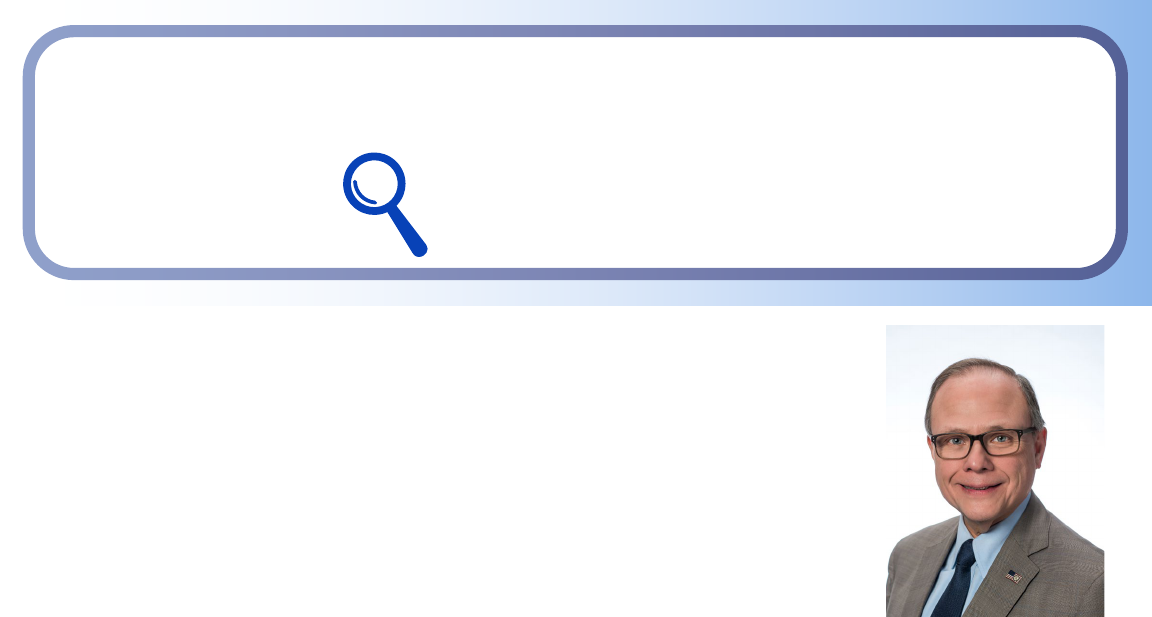
14
Can you start by telling us a bit about yourself and your
role in IDFPR?
I began employment with the Illinois Department of Financial
and Professional Regulation on August 1, 2012. As Chief of
Investigations for the Division of Real Estate, I direct, develop,
and implement a statewide comprehensive investigation
program geared toward enforcement of the Illinois Real Estate
License Act of 2000, the Real Estate Appraiser Licensing Act
of 2002, the Auction Licensing Act, the Home Inspector Act,
the Community Association Manager License and Disciplinary
Act, and the Appraisal Management Company Registration
Act. I help develop and implement policies & procedures
dening disciplinary case review and referral, ensuring that
investigative procedures are in accordance with applicable
laws, rules, and regulations.
What does the Chief of Investigations unit do?
I serve as a full-time supervisor assigning and reviewing
work, providing guidance and training to assigned sta, and
counseling sta regarding work performance. I also respond
to inquiries from complainants, respondents, and members of
the general public.
What is something you are proud to have accomplished
at IDFPR?
I am particularly proud of helping the Division of Real Estate’s
Appraisal Unit improve compliance with federal regulation
and the requirements of the Appraisal Subcommittee of the
Federal Financial Institutions Examination Council (“ASC”).
What is a personal accomplishment you’re proud of?
I am actually very pleased with two personal accomplishments
in particular: Being a graduate of the 188th Session of the FBI
National Academy, Quantico Virginia, and being sworn to the
Bar of the Supreme Court of the United States of America.
Tell us about a moment/turning point in your life that
you learned/grew from?
The importance of family, duty, and loyalty was reinforced in
me while serving as a caregiver for my elderly inrm parents in
the autumn of their lives.
What are some other jobs/positions you’ve held or
pursued?
Outside of my duties with the State, I currently serve as an
Arbitrator in the Cook County Mandatory Arbitration Program
of the Circuit Court.
I also serve as a member of the Board of Directors at the
“New Roseland Community Hospital.”
Prior to joining IDFPR, I served
as a commander in the Chicago
Police Department (“CPD”)
leading various units. As
Commander of Management
& Labor Aairs, I represented
the CPD during negotiation of
collective bargaining agreements
with various labor organizations
and at arbitration proceedings
and hearings.
As Commander of the CPD
Internal Aairs Division, I was
responsible for directing and
coordinating investigations of
alleged ocer misconduct or
corruption. I was subsequently assigned to the Bureau of
Detectives overseeing approximately two hundred detectives
investigating homicides and property crimes on the west
side of Chicago. In 2009, I became Commander of the Vice
Control Division in the Bureau of Organized Crime, where I
was responsible for the city-wide investigation of licensed
business establishments, solicitation, human tracking, and
illegal gambling. During my time in the Bureau of Organized
Crime, I was federally deputized to represent the CPD on the
“FBI Crimes against Children Human Tracking Task Force.”
My last assignment with the CPD was as Commander of the
025th District (Grand and Central) overseeing approximately
three hundred and twenty police personnel.
Summer is coming, what are some of your favorite
summer activities?
When summer arrives, I look forward to enjoying time at the
family lake house in Michigan where I can swim, sh, and
lunch on the pontoon boat.
What hobby/special interest/talent do you have that we
be surprised about?
I enjoy musical instruments, particularly the guitar, piano, and
clarinet. However, I have not yet mastered any of them. I am
also fascinated by foreign languages and the origin of words.
Sp tlight:
Employee
Hector
Rodriguez
Hector Rodriguez
Chief of Invesgaons

15
SCHOLARSHIP PROGRAM
IDFPR’s Diversity Real Estate Scholarship Program awards 60 diversity scholarships every year. This
scholarship program is administered through the Illinois Real Estate Educational Foundation and awards
sixty $500 scholarships to Illinois residents of diverse racial origin pursuing courses of study that will
prepare them for careers in real estate or enhance the skills and knowledge that they currently use as real
estate professionals.
For more information and how to apply click: Illinois Diversity Real Estate Scholarship Program
DRE BOARD OPENINGS
We are always looking for new board member candidates! It is imperative we maintain a pipeline of potential
board member candidates as terms expire and/or vacancies must be lled.
If you or someone you know might be interested in serving on a Board, please have them email Jennifer
Rossiter Moreno at Jennifer[email protected].
Renewal Deadlines!
• Community Association Manager
8/31/2023
• CertiedResidentialRealEstateAppraiser
9/30/2023
• CertiedGeneralRealEstateAppraiser
9/30/2023
• AssociateRealEstateTraineeAppraiser
9/30/2023
• LicensedAuctionCESchool
12/31/2023
• AuctionCECourse
12/31/2023
• HomeInspectorEducationProvider
12/31/2023
• HomeInspectorPre-licenseCourse
12/31/2023
• HomeInspectorCECourse
12/31/2023

16
CHRIS POSEY: NEW
BOARD MEMBER FOR THE
REAL ESTATE APPRAISAL
ADMINISTRATION AND
DISCIPLINARY BOARD
The Division of Real Estate welcomes new Appraisal Administration and Disciplinary Board member,
Christopher (Chris) Posey. We are thrilled to have Chris’ expertise on the Board.
Chris began his career as a Certied Residential Real Estate Appraiser in 2005 while also working in the
banking profession on the treasury/cash management side. Originally pursued as a side business, CJP
Appraisal Services LLC continued to grow, eventually allowing Chris to leave the banking profession in
2021 to focus his energy strictly on the real estate profession. His experience is performing residential
real estate valuation services for lenders and private/non-lender work, as well as performing commercial
valuation services by partnering with a Certied General Real Estate Appraiser.
Chris is a graduate of Southern Illinois University at Carbondale with a bachelor’s degree in marketing (May
1997) and a Master’s degree in Business Administration. He is married to his college sweetheart (Latasha).
They have two children (Devani - 25 years old; Ryan - 16 years old). In his spare time for fun, he likes to
hit the weights at the gym.

17
To access our Enforcement Reports in their entirety, please visit the IDFPR Consolidated Reports webpage at https://idfpr.
illinois.gov/news/disciplines/discreports.html.
UNLICENSED
One individual was ordered to cease and desist from engaging in auction rm activities that require a license in Illinois under
the Auction License Act
An individual was ordered to cease and desist engaging in any community association manager activities in Illinois without a
license and assessed a civil penalty of $1,000 for the unlicensed practice of community association management.
Two individuals were ordered to cease and desist engaging in any community association manager activities in Illinois
without a license and assessed a civil penalty of $500 for engaging in the unlicensed practice of community association
management.
Three individuals were ordered to cease and desist the unlicensed practice of real estate.
APPRAISAL
A certied residential real estate appraiser license was reprimanded, and the licensee was ordered to complete a class for
making errors and omissions that led to the communication of a misleading appraisal report.
A certied residential real estate appraiser license was suspended for failure to le and/or pay Illinois state income taxes.
AUCTION
An auction licensee was ned $1,000 for engaging in the practice of auction activities in the State of Illinois prior to obtaining
a license pursuant to the Auction Licensing Act.
COMMUNITY ASSOCIATION MANAGER
A community association manager licensee was ned $3,000 for engaging in the practice of community association
management activities in the state of Illinois prior to obtaining a license pursuant to the Community Association Manger
License and Disciplinary Act.
A community association manager license was revoked, and the licensee was ned $5,000 for unprofessional conduct,
commingling, and mismanaging of client’s funds, and for removing association funds without authorization.
REAL ESTATE
Twenty real estate broker licenses were suspended for failure to le and/or pay Illinois state income taxes.
A real estate broker license was suspended for being more than 30 days delinquent in the payment of child support.
A real estate manager broker license was suspended for failure to le and/or pay Illinois state income taxes.
A real estate broker license was ned $5,000 and the licensee was ordered to take a class for aiding and abetting in the
practice of real estate by an unlicensed entity.
A real estate managing broker license was placed on probation for 2 years, was ned $6,000 for performing licensed real
estate activities while the license was not renewed and while the sponsor’s license was inactive, for failure to supervise, and
for failing to complete required continuing education prior to renewing the license and falsely stating that they were exempt
from the requirement.
A real estate broker license was ned $8,000 and the licensee was ordered to take a class for aiding and abetting in the
practice of real estate by an unlicensed entity.
QUARTERLY
ENFORCEMENT
REPORT
REAL ESTATE DIVISION ENFORCEMENTS
MARCH & APRIL 2023

State of Illinois
Illinois Department of Financial and Professional Regulaon
IOCI 24-0005 7-23 Web
CONTACT US
Licensing and Testing
320 West Washington Street
3rd Floor
Springeld, Illinois 62786
General Assistance:
1-888-473-4858
Enforcement, Complaints, and
Investigations
555 West Monroe Street
5th Floor
Chicago, Illinois 60661
Complaint Intake Unit:
Continuing Education
Citations:
TTY Line:
866-325-4949
Check out our DRE FAQ
playlist on YouTube here!
https://idfpr.illinois.gov/dre.html
A real estate limited liability rm license was placed on probation for two years and was ned $2,000 for engaging in licensed
real estate activities while its license was inactive.
A real estate managing broker license was ned $3,000 and the licensee was ordered to complete additional education for
aiding and abetting an applicant engaged in licensed real estate activities and for failure to supervise an unlicensed assistant.
A real estate broker corporation license was ned $3,000 for aiding and abetting an applicant engaged in licensed real
estate activities and for failure to supervise.
A real estate managing broker license was suspended and ned $2,000 for failing to provide the Department with documents
requested during a Broker Verication Examination and for failing to notify the Department of any change in email address
or phone number within 24 hours after such change
A real estate managing broker license was ned $2,000 and the licensee was ordered to take a class for aiding and abetting
the unlicensed practice of real estate and for engaging in licensed real estate activities while the license was suspended.
A real estate managing broker license was revoked and ned $25,000 for altering a sales contract without authorization from
all parties, failing to deposit earnest money in an escrow account, failing to account for or remit money belonging to others,
engaging in unprofessional conduct, dishonest dealing, pursuing a continued and agrant course of misrepresentation and
making false promises, failing to make available to the Department all escrow records within 24 hours of the Department’s
request, failing to maintain transaction les for ve years, and for failing to report the loss of escrow records to the Department.
A real estate managing broker license and real estate corporation license were ned $2,000 jointly and severally and a real
estate managing broker was ordered not to engage in property management services indenitely, for a minimum period of
2 years, for failing to act in a manner consistent with promoting the client’s best interests as opposed to theirs or any other
person’s self-interest by failing to timely account for all money and property received in which the client has, may have, or
should have an interest and for failing to account for or remit any money coming into their possession that belonged to
another person.
A real estate managing broker license was revoked and ned $15,000 for failing to return monies to two separate individuals
obtained in contemplation of real estate investments that never came to fruition, making false promises in connection with
those investments, failing to account for or remit moneys or documents coming into the licensee’s possession that belonged
to others, engaging in dishonorable, unethical, and unprofessional conduct of a character likely to deceive, defraud, or harm
the public, and for failing to respond to the Department’s request for information within 30 days of the request.
Four real estate managing broker licenses were suspended for failure to le and/or pay Illinois state income taxes.
Fourteen real estate broker licenses were suspended for failure to le and/or pay Illinois state income taxes.
The material and information contained in this newsletter is for general information purposes only and should not be
considered legal advice. You should not rely upon the material or information in the newsletter as a basis for making any
business, legal, or other decisions. Information contained herein may not constitute the most up-to-date information.
Please consult an attorney to obtain legal advice or interpretation of any applicable laws.
